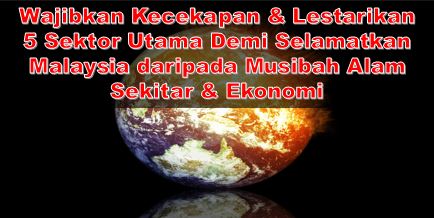“ Mereka miskin kerana mereka pemalas” “Ayah dia Tan Sri” “Dia kenal orang dalam” “Aku boleh berdiri seperti sekarang kerana usaha kuat aku selama ini” Luahan-luahan ini biasa didengari dalam ‘borak kedai kopi’, setiap kali topik kaya dan miskin dibincangkan. Ramai pantas menyamakan isu jurang pendapatan yang tidak sama rata sebagai isu kebajikan atau sosialis. Ini berlaku di mana-mana, sedihnya …
Read More »The Myth of the Rich and Poor
The Myth of the Rich and Poor “They are simply lazy” “His father is a Tan Sri” “He knows someone from the inside” “I made it purely out of effort; I worked hard to get where I am today” These are some typical expressions that are sure to be heard in coffee chats, every time the topic of rich and …
Read More »8 Realiti Mengapa Kerajaan Malaysia Wajar Biayai Pendidikan Tinggi
Penubuhan institusi pendidikan ialah satu usaha murni dalam mewartakan proses penggarapan ilmu pengetahuan dan penyelidikan secara formal. Universiti-universiti terawal dalam sejarah dunia seperti Al-Azhar, Bologna, Oxford, Palencia, Cambridge dan University of Naples (universiti awam tertua dunia, 1224) telah dibina oleh tamadun-tamadun awal dunia berlandaskan satu tujuan; sebagai pusat penyelidikan, penyampaian ide, pendidikan dan pembelajaran, serta perkembangan ilmu pengetahuan melalui medium …
Read More »Why the Malaysian Government should fund Higher Education
Education was institutionalized to formalize the process of knowledge acquisition and research in man’s quest for understanding. Earliest universities in the history of mankind namely Al-Azhar, Bologna, Oxford, Palencia, Cambridge and University of Naples (world’s first public university, 1224) have one thing in common; they were built by notable early world civilizations as institutions of research, discourse, learning, proliferation of …
Read More »Case Study – Abuse of Power in Contemporary Organisations
Abuse on keeping talent pool thin This report will exhibit further case study and example of an organizational abuse of power. South and Matejka (1990) observe that “weak performing superiors avoid selecting individuals who will threaten their status and contrast their own substandard performance. Suprisingly, they seem able to do this rather well.” This can be categorized as a hierarchical …
Read More »Power, Ethics, Decision Making and CSR
Power tends to corrupt, and absolute power corrupts absolutely. (Lord Acton, 1887, Letter to Bishop Creighton) The quote above by Lord Acton implores that power can corrupts and with authority attractively will lead to power abuse. In this report, abuse of power in organizations will be analyzed and explored succinctly within the context of power and authority, total institutions, ethical …
Read More »Exploring smartphone brand preference for executives in the Malaysian Oil and Gas industry
A Research Proposal Introduction “Mr Watson – come here – I want to see you”, were the very first words which was uttered by Alexander Graham Bell on the 10th of March 1876 and were also the very first words to have travelled through a telecommunication line transmitted from one point to another end. This historical moment marks the beginning …
Read More »Ethical Training Program’s Impact and Influence on Employee’s Ethical Culture in the Malaysian Oil and Gas Industry.
A Research Proposal Introduction A study by the Ethics Resource Centre (2011) recently found that organizations behave differently according to prevailing economic situations or conditions. As economic sentiments get better, misconduct is observed to have risen and whistle blowing activities concerning ethical misconduct is seen to have dropped. Ethical misconduct is also proven to be more prevalent in organizations with …
Read More »Is your university lecturer a manager? Understanding Managerial Functions and Roles
Question: Is your university lecturer a manager? Discuss in terms of managerial functions, managerial roles, and skills. According to Theodore Levitt, management consist of the rational assessment of a situation and know what is to be done, strategies to achieve the goal, marshalling of resources, control of the activities and finally motivating the resources to do the work. According to …
Read More »Motivation through Leadership – The Case Study of Ms Zee, MBA
Motivation through Leadership Question: Ms Zee, MBA graduate from OUM, came home to manage her family business upon the death of her father. She found the morale and productivity of the employees low due much to the autocratic leadership of her father, who built the company from scratch, and his long illness. Discuss how she could motivate the staff and …
Read More »Motivation through Leadership
Question: Ms Zee, MBA graduate from OUM, came home to manage her family business upon the death of her father. She found the morale and productivity of the employees low due much to the autocratic leadership of her father, who built the company from scratch, and his long illness. Discuss how she could motivate the staff and get the company …
Read More »The leadership of Gary Convis
Question: Do you think Fiedler’s position power, task structure, or leader-member relations was the most important aspect of Gary Convis’s leadership at the Georgetown plant? The first comprehensive contingency model for leadership was developed by Fred Fiedler which is an expansion of the leadership flexibility theory. The Fiedler contingency model proposes that effective group performance depends on the proper match …
Read More »The Leadership of Akio Toyoda
Question: How would you describe Akio Toyoda’s leadership style? Explain. Akio Toyoda’s leadership style can best be described as a combination of a transformational and entrepreneurial leadership. Transformational leadership is a leadership that inspires the entire organisation and affects the employee’s belief by gathering their wills and encouraging employees to perform to their leader’s vision. (Certo & Certo, 2006, pp …
Read More »Management Theories: Human Relations Movement
Refer Case Study “Family Feeling Faces Challenges at Smucker’s” in Certo, Modern Management, 10e, pg. 46-47. Question: Does the human relations movement offer any insights for the co-CEOs as they move ahead with their expansion plans? Human relations movement refers to a group of people who do study and research on the behavior of people at the workplace in groups. …
Read More »The leadership behaviour of Yoshi Inaba
Question: Where on the continuum of leadership behavior would you place Yoshi Inaba, and why? In 1938, Lewin and Lippitt proposed classifications of leaders based on how much involvement leaders placed into task and relationship needs. This range of leadership behaviors was expressed along a continuum by Tannenbaum & Schmidt in 1973, ranging from boss-centered to subordinate-centered. The furthest on …
Read More » Anas Alam Faizli Magna Est Veritas Prae Velabit – The Truth is Mighty and will always Prevail!
Anas Alam Faizli Magna Est Veritas Prae Velabit – The Truth is Mighty and will always Prevail!



















